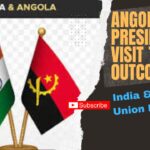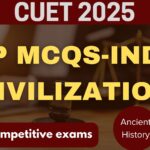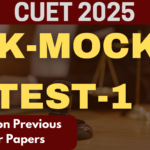CUET GK 2025-Most important Books & Authors
📚 CUET GK Preparation: Most Important Books & Authors (17/50)
Welcome to Episode 17 of our CUET 2025 GK Series! In this video, we’re diving deep into important Books & Authors — a high-weightage topic for CUET General Studies.
We’ve categorized the authors & books to make your prep more structured and easy to revise! 🧭
Categories Covered:
✅ Freedom Fighters – Books written by or about India’s legendary revolutionaries.
✅ Prime Ministers & Presidents – Must-know autobiographies, biographies & their authored works.
✅ History Related Works – Iconic historical texts every CUET aspirant should remember.
✅ Nobel Laureates – Books by Indian & global Nobel Prize winners.
✅ Current Affairs – Recently released books, trending authors, and important launches from the past year
Youtube Vedio Link:
CUET GK 17/50 Most Important Books & Authors. Download PDF!
Get a printable PDF version of most important Books & Authors for your CUET GK 2025 preparation. This handy revision sheet is perfect for quick reference, last-minute prep, and offline study. Click below to download and boost your General Knowledge score!
Books Written by Freedom Fighters:
Bal Gangadhar Tilak: Speeches and Writings of Tilak – Collection of speeches and writings outlining his nationalist philosophy.
Bhagat Singh: Why I Am an Atheist – A powerful essay explaining his rationalist and revolutionary ideology.
Bhagat Singh: Jail Diary – Personal thoughts and reflections written during his imprisonment.
Gopal Krishna Gokhale: Essays on Indian Economics – Insight into colonial economic policies and reforms needed for India’s progress.
Jawaharlal Nehru: Letters from a Father to His Daughter – Educational letters to Indira Gandhi, covering world history in simple language.
Jawaharlal Nehru: The Discovery of India – Deep exploration of Indian history, philosophy, and culture, written during imprisonment.
Lala Lajpat Rai: Unhappy India – A response to Katherine Mayo’s Mother India, criticizing Western misinterpretations of Indian society.
Maulana Abul Kalam Azad: India Wins Freedom – First-hand account of key events and politics during India’s freedom struggle.
Mahatma Gandhi: Hind Swaraj (1909) – A critique of modern civilization and outline of his vision for self-rule (Swaraj).
Mahatma Gandhi: The Story of My Experiments with Truth – His spiritual and moral autobiography.
Mahatma Gandhi: Young India – Weekly journal writings promoting non-violence and self-reliance.
Subhas Chandra Bose: Indian Struggle (1920–1942) – His political experiences and views on India’s path to freedom.
Subhas Chandra Bose: Gandhi vs Lenin – Comparative reflection on ideologies and revolutionary strategies.
Vinayak Damodar Savarkar: The Indian War of Independence (1857) – A nationalist version of the 1857 revolt, countering British narratives.
Books written by Nobel Prize Winners (Indian)
📝 1. Rabindranath Tagore
Nobel Prize in Literature (1913) — First Asian Nobel laureate
Gitanjali (Song Offerings)
– Collection of devotional poems that won him the Nobel Prize.
– Deeply spiritual and lyrical, influenced by Upanishads and Bhakti.
– Originally in Bengali, later translated by Tagore himself into English.The Home and the World
– Novel set during the Swadeshi movement; explores nationalism vs personal freedom.Gora
– A philosophical novel discussing caste, religion, and identity.Kabuliwala, The Postmaster, and other short stories
– Humanistic and poignant stories rooted in Bengali life.
🕊️ 2. Mother Teresa
Nobel Peace Prize (1979)
No Greater Love
– Collection of her speeches, thoughts, and prayers.
– Focuses on compassion, service, and love for the poor.A Simple Path
– Describes the mission and daily life of the Missionaries of Charity.
🧮 3. Amartya Sen
Nobel Prize in Economic Sciences (1998)
Development as Freedom
– Seminal work explaining how development should be seen as expanding freedoms (not just GDP).The Argumentative Indian
– Collection of essays on Indian history, culture, identity, and democracy.Identity and Violence
– Explores how narrow identities (religious, ethnic, etc.) can fuel conflict.Poverty and Famines
– Groundbreaking work showing how famines are caused by lack of access to food, not just food shortage.
👧 4. Kailash Satyarthi
Nobel Peace Prize (2014) – For his work against child labor and for children’s rights
Will for Children
– Focuses on his experiences rescuing children from forced labor.
– Less of a literary work, more activist-oriented.
🎶 5. Abhijit Banerjee (with Esther Duflo)
Nobel Prize in Economic Sciences (2019)
Poor Economics
– Uses real-world experiments to understand poverty and suggest practical solutions.
– Very readable and widely acclaimed.Good Economics for Hard Times
– Tackles complex global issues like inequality, migration, and trade with data-driven insights.
Books written by Prime Ministers:
1. Jawaharlal Nehru
The Discovery of India – History and cultural exploration, written in prison.
Glimpses of World History – 196 letters to Indira Gandhi explaining world history.
An Autobiography (Toward Freedom) – Political and personal memoir.
2. Indira Gandhi
My Truth – Autobiographical reflections on her political career and controversies.
Letters from Indira Gandhi to Children – Educational letters encouraging curiosity and discipline.
3. Rajiv Gandhi
No authored books, but many collections of speeches and writings have been published posthumously.
4. Atal Bihari Vajpayee
Meri Ekyavan Kavitayen (My 51 Poems) – Collection of his Hindi poetry.
Decisive Days – A compilation of his thoughts and speeches.
5. Dr. Manmohan Singh
Changing India (5-volume set) – Detailed account of his policy-making journey as economist and PM.
Many academic papers on economics before politics.
6. Narendra Modi
Exam Warriors – A motivational book for students about handling exam stress.
Convenient Action: Gujarat’s Response to Challenges of Climate Change – On climate initiatives during his time as CM.
Letters to Mother – Reflective and spiritual writings from his early life.
🏛️ Books by Indian Presidents
1. Dr. A.P.J. Abdul Kalam
Wings of Fire – His inspiring autobiography.
Ignited Minds – Vision for India’s youth.
India 2020 – Vision document to make India a developed nation.
Turning Points – Follow-up to Wings of Fire, focusing on his presidential term.
Transcendence – His spiritual journey, especially with Pramukh Swami Maharaj.
2. Dr. Rajendra Prasad
Atmakatha (Autobiography) – Insight into India’s first President’s life.
India Divided – His views on Partition.
3. S. Radhakrishnan
The Philosophy of Rabindranath Tagore
Indian Philosophy (2 volumes)
The Hindu View of Life – Introduces Indian religious and philosophical traditions.
4. Pranab Mukherjee
The Turbulent Years: 1980–1996
The Coalition Years: 1996–2012
The Presidential Years: 2012–2017
The Dramatic Decade: 1970–1980
Books from Current Affaires:
- Leo — The Untold Story-P.S. Raman
- Justice PN Prakash Releases ‘Memories and Milestones’
- Kailash Satyarthi’s Autobiography ‘Diyaslai’ Launched
- “Indian Renaissance: The Modi Decade”-Aishwarya Pandit
- Amitabh Kant- (G20 Sherpa) -“How India Scaled Mt G20” & “Life on Mars: Collected Stories,”
- Pankaj Mishra – The World After Gaza
- Dinesh Shahra (Ruchi soya: yellow revolution) Launched Book – Dalai Lama’s Secret to Happiness
- Prajakta Koli’s (Creator) -“Too Good To Be True”
- EAM S. Jaishankar launched his book ‘Why Bharat Matters’ in Dubai
- Sakshi Malik’s memoir – “Witness,” co-authored by Jonathan Selvaraj
- Deepa Malik (para Athelete from Haryana)-“BRING IT ON: The Incredible Story of My Life”
- Amitav Ghosh ( won the 54th Jnanpith award in 2018)-“Wild Fictions.”
- Nobel laureate Abhijit Banerjee launched his new book,
- “Chhaunk: On Food, Economics, and Society
- Arundhati Roy’s– “Mother Mary Comes to Me,”


















Leave a Reply